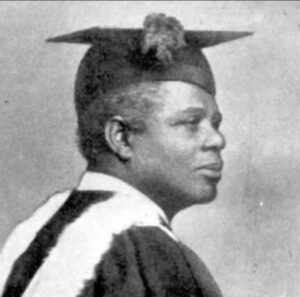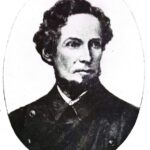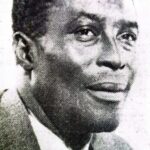BROWN, EMMANUEL JOSEPH PETER
- 4 Min Read
Emmanuel Joseph Peter Brown (1875-May 1929) was a lawyer, journalist, and nationalist, and an author of talent. He would have merited recognition as an outstanding political leader had he not been outshone by his contemporary, J. E. Casely Hayford.

PHOTO CAPTION: Emmanuel Joseph Peter Brown. SOURCE: EAP Library
After World War I. Brown and Casely Hayford vied bitterly for leadership of the Aborigines Rights Protection Society (A.R.P.S.). Casely Hayford, perhaps an abler man, got the upper hand, with the result that Brown, till his death, lived in his shadow. E. J. P. Brown originally came from the district of Abora, though he lived in Cape Coast. He was born in 1875 and was educated in Wesleyan schools in Cape Coast, where he later taught in Methodist schools for some years. He then became a clerk, and later chief clerk, in the law offices of John Mensah Sarbah. Perhaps because Sarbah wanted to reward his reliability, or perhaps because he intended to make him his business partner, he sponsored Brown’s legal education in England. It is not certain when Brown returned from England, but he was a well-established lawyer by 1910, the year his benefactor died.
On his return home, Brown entered politics as a member of the A.R.P.S. In the election of the society’s officers in 1911, he was elected one of its three vice-presidents. This was the period of agitation against the Forest Lands Bill of 1911. In September 1911 Brown, together with Caseley Hayford and C. J. Bannerman, was sent by the society to oppose the second reading of the bill in the Legislative Council. In spite of their criticisms, however, the bill was passed. The society then established a newspaper, The Gold Coast Nation, with Brown as its editor. He used its columns to attack the bill. Later the society sent a delegation, consisting of Casely Hayford, Brown, T. F. E. Jones, and Dr. B. W. Quartey-Papafio, to England to protest against the bill. The bill was not withdrawn, but never became law because Governor Sir Hugh Clifford (term of office 1912-19) shelved it
In 1913 Brown, on behalf of the A.R.P.S., opposed the Palm Oil Bill (which sought to establish a local manufacturing monopoly) in the Legislative Council, but lost. Yet the law could not be implemented because of the opposition of the society, as well as of some British firms. After World War I, Brown refused to join the group which formed the National Congress of British West Africa, and so lost the leadership of the A.R.P.S. to Casely Hayford and his colleagues. He was expelled as vice-president, and he and his associates were removed from the society’s executive in 1922.
Brown’s expulsion from the society did not end his public-spirited service. Governor Clifford had nominated him in 1916 to be a member of the Legislative Council, and he continued to be a member till 1927, the year in which African members were, for the first time, elected. Poor health may have prevented Brown from testing his popularity in Cape Coast, for between 1927 and the time of his death his health deteriorated sharply.
Brown was a very versatile man. In addition to his legal, journalistic, and political activities, he also wrote several books. These included Fante primers and grammar books, and a useful two- volume book in English, entitled the Gold Coast and Ashanti Reader, published in 1929, which was a collection of folk tales, proverbs, customs, and manners. It included correct responses to greetings, data on fashions and festivals, and some biographies. In spite of the disgrace which the A.R.P.S. meted out to him and his colleagues in 1922, the Gold Coast Times, the official organ of the society, paid him a warm tribute on May 18, 1929, after his death.
S. TENKORANG




